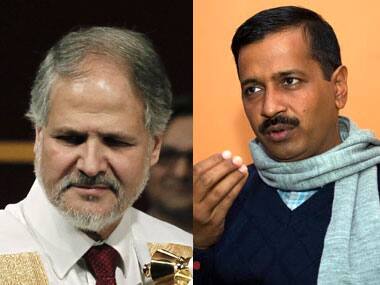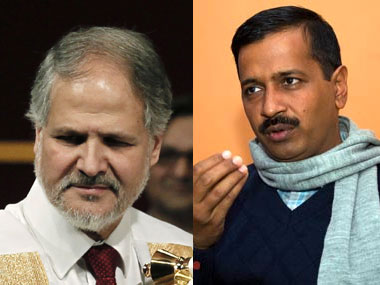The latest round of conflict between Chief Minister Arvind Kejriwal and Lieutenant Governor Najeeb Jung over stamping authority is “unfortunate” and “ultimately people will suffer if both constitutional authorities pull the city administration in different directions”, advocate KC Mittal, former president of Delhi High Court Bar Association, told Firstpost. Taking on the Delhi CM after he reportedly instructed all senior officials and ministers of his government not to send files to the office of the Lieutenant Governor and take decisions on subjects that come under the jurisdiction of the government on their own, Jung directed the Chief Minister’s Office to follow the Constitution (the GNCTD Act 1991 and Transaction of Business Rules 1993).  He said all important files had to be routed through him. The GNCTD Act 1991 and Transaction of Business Rules 1993 underline the relationship between the CMO and the Lieutenant Governor’s office. “What I think is the central government has not perhaps reconciled to the conferment of power to the elected body of Delhi,” he said. Reacting to Jung’s reference to the Constitution and the Delhi Government Act to explain that the role of the CM and his Council of Ministers is to aid and advise the Lieutenant Governor, he said, “Before the 69th Constitutional Amendment, which introduced Article 239 AA, Delhi was a metropolitan council having advisory power. But after the introduction of the Article 239 AA, a legislative assembly was set up with legislative powers. And under the constitutional scheme in the democracy, it is the elected representative who has all the powers and roles to play. The Lieutenant Governor, in all matters where there is a legislative power of the Delhi assembly, cannot act independently. He can act only on aid and advice of the Chief Minister and his Council of Ministers. He cannot reverse any order. If he does so, it is undemocratic and unconstitutional.” At the same times, he says, the CMO also cannot instruct officials not to send files to the office of the Lieutenant Governor because all decisions taken by the Council of Ministers need to be approved by him. “In fact, both authorities are supposed to work in tandem. Any one of them trying to use power in defiance of the Article 239 AA would really be flouting the Constitution,” said Mittal, adding that “sometimes, they take route of Business Rule but it has to be in accordance with the Constitution. The Business Rules in conflict of the Constitution cannot be imposed”. Asked about the legitimacy of Kejriwal’s reported direction that files related to subjects over which the Delhi government has no jurisdiction should also pass through his office, Mittal said, “The subjects, namely police (entry 1), public order (entry 2) and land (entry 18) in the state list under the Constitution of India, the power has not been given to the Delhi Assembly. As such, the Delhi government may not have even the executive power in the three subjects. “The major controversy here is control over the police and maintaining law and order. Law and order, as such, is not a listed subject under Schedule 7 of the Constitution, be it the Union List or the State List or for that matter Concurrent List. There is a complete misconception about the law and order, which has always been a contentious issue between the state and the Centre. “Primarily, law and order is about prevention, investigation and prosecution of a crime. These areas are covered by the Code of Criminal Procedure (CrPC ). The measures taken to prevent a crime like imposition of 144 or registration of FIR, investigation, arrest and all steps to further probe, its conclusion and submission of charge sheet, all are regulated by the CrPc. Even the trials are conducted as per the provisions of the CrPc. “Interestingly, as per Article 239 AA, Sub Articles 3a and 4 the Delhi assembly has power to make laws regarding the CrPc and the Indian Penal Code (criminal law). It is empowered enough to even make laws pertaining to preventive detention. It means, the Delhi assembly has legislative and the government has executive powers. Since the law and order comes within this framework, Delhi assembly has carried out some amendments in the CrPc. Therefore, there should be no confusion about control over the police. As far as the structure, internal administration, finance, etc are concerned, the Delhi assembly will have no power to legislate. But Delhi Police in the role of a law enforcing and an investigating agency functions as per the CrPc and therefore, it will come within the domain of the Delhi assembly.” “Public order, which is entry number 2 in the State List, has been defined by the Supreme Court as complete breakdown of law and order and creation of an anarchy-like situation. In this case, the Union Ministry of Home Affairs will have its role but not in every case which is regulated under the CrPc.” “There is also a lot of confusion about entry 18, which is about control over land. Take the case of DDA. It is a development authority, not a land authority. How can the Centre have control over it when it is not covered within the entry 18 of Schedule 7 of the State List? Same is the case with the civic bodies of the national capital.” Adding that there is “no change of mindset of the Union Government even after the Constitutional Amendment of 1991”, Mittal concluded, “They (the Centre) want to administer Delhi as a union territory as it existed prior to the amendment. Despite the fact that the Constitution has given it enough power, they think Delhi is their baby.” Other legal experts Firstpost spoke to pointed out similar ambiguity in the provisions that separate the responsibilities of the Centre and the state. This, they say, was not in focus because the previous governments at the Centre and the state avoided making an issue of it. Now that the AAP government has started asking for clarity, which is not bad at all, some confrontation is expected. However, if it becomes a bitter political fight involving the Union government and the state it might be a serious problem, they said.
The latest round of conflict between Chief Minister Arvind Kejriwal and Lieutenant Governor Najeeb Jung over stamping authority is “unfortunate”
Advertisement
End of Article


)
)
)
)
)
)
)
)
)



